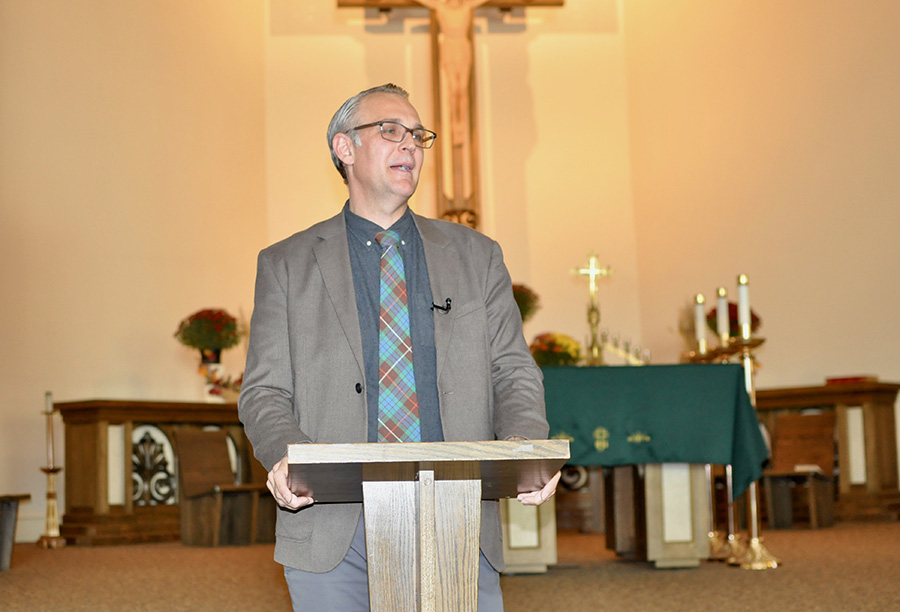
A professor with an extensive background in Catholic education, Dr. Ryan Hanning shared stories and wisdom during his first Fall Conference keynote address on Oct. 25 in Rice Lake. (Catholic Herald photo by Anita Draper)
Anita Draper
Catholic Herald staff
Articulating the “deep and beautiful call” to share the faith, theologian Dr. Ryan Hanning presented two keynote addresses – one on the pillars of Catholic education, another on happiness and purpose – at the Diocese of Superior’s 2024 Fall Conference.
The annual event, primarily a day of formation and continuing education for educators and catechists, opened at St. Joseph Catholic Church, Rice Lake, on Friday, Oct. 25, with Mass celebrated by Bishop James P. Powers. Dr. Hanning’s first keynote followed a demonstration by Studio 3:16, a religious education program that uses entertainment to “fan the flames” of faith in elementary-level classrooms.
Hanning, who lives on a homestead outside of Nashville with his wife and family, has 10 children ranging from ages 4 to 23 and an extensive, decades-long background in Catholic education.
Framing education “in the mind of the church,” Hanning explained that the church understands “every child is born with unalienable dignity.” In addition to material needs – clothing, shelter, food, water – children also require education to reach their potential. Among those needs, which are largely biologically driven and passively received, “education is different because education is intellectual and spiritualized,” he said.
The Catholic Church has always understood education to be a fundamental human good necessary for fulfillment. It helps people to know who they are and how to live, and this mission of Catholic education, wherever it happens, “is to form men and women in truth of who they are and discover their mission,” he added.
It’s essential and important work, Dr. Hanning emphasized, not secondary. It’s connected into the entire mission of the church, which is to reconcile God and man. Those who work in education collaborate with the church to provide this fundamental good.
A principal proclamation of Catholicism is that Jesus came to reconcile us back to God, to answer fundamental questions about who we are and what we should do. Catholic education, which is central to the life of the church, is caught up in this mission and must have a clear identity, he argued. Catholic education is the place where students encounter Christ.
“So much of what we do as educators is helping students reach back to God,” he said, not only students but also their families. Speaking of the innocence of children and how quickly it can be lost in this fallen world, Dr. Hanning commented, “We, as educators, have an opportunity to help them reach out to the one who will heal them.”
Five pillars
“Catholic education answers the fundamental questions” of human life; Dr. Hanning said the five pillars of Catholic education begin with, first, a supernatural horizon.
True education forms the whole person, he explained, and seeks to raise eyes to heaven, to form good citizens of this world and in the world to come.
The problem with most education today is it is too “downward facing” – technical and career-driven, and doesn’t elevate students toward the supernatural.
The second pillar is “an authentic view of the human person,” he continued. Teachers and catechists do not preside over factories, he said. Education is not a commodity, even if they equip students with enviable skills.
The third pillar, “a communion of persons,” emphasizes the relationships between students and teachers, staff, etc. Catholic schools are a community, he said, not a factory or simply a physical location. It’s a community of individuals who are there to grow in their understanding of God and his mission.
The fourth pillar is that Catholic schools are tasked with presenting a Catholic worldview, understanding of the entirety of the Catholic faith. The worldview integrates intellectual, spiritual, emotional and mental formation and is intentionally directed to the formation of the whole person. Education is where people search for truth, prepare for mission into their vocation.
Finally, the fifth pillar is that teachers are witnesses, and their role is to educate and serve but also to demonstrate, with their witness, the truths they are communicating.
Hanning finished with a prayer before attendees were released for lunch.
